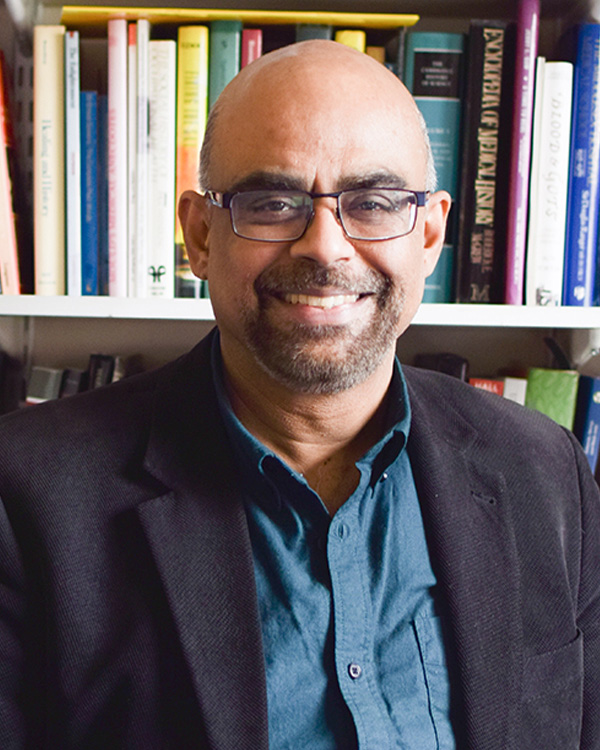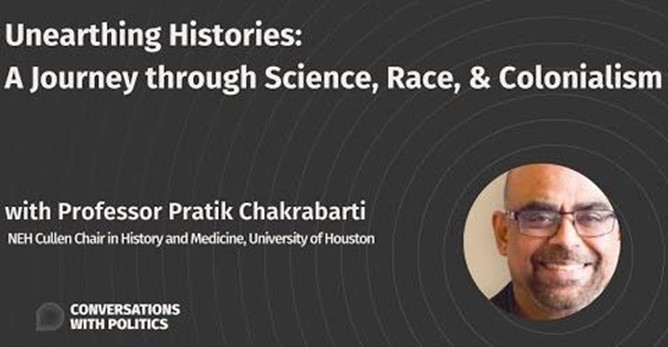Pratik Chakrabarti | Department of History
Pratik Chakrabarti
NEH Cullen Chair in History and Medicine

Email: pchakra7@central.uh.edu
Office:
Pratik Chakrabarti is the National Endowment for the Humanities Cullen Chair in History
& Medicine. Pratik received his PhD from the Centre for Historical Studies, Jawaharlal
Nehru University, New Delhi, India. Before joining the University of Houston in 2022,
Pratik was the Chair in History of Science and Medicine, at the Centre for the History
of Science, Technology and Medicine (CHSTM), University of Manchester. He was also
the Director of CHSTM. Pratik was a UK REF 2021 Panel Member (History), the quinquennial
review of university research outputs in the United Kingdom. From 2010 to 2018 he
was one of the editors of the leading peer-reviewed journal, Social History of Medicine, published by Oxford University Press. He is currently the Chair of the William Welch Medal award of the American Association of the History of Medicine.
Research Interests
Pratik has contributed widely to the history of science, medicine, and global and imperial history, spanning South Asian, Caribbean, and Atlantic history from the eighteenth to the twentieth century. His new project, which is funded by his Chair, is called “Health is Politics”.
He is currently writing a book, tentatively titled, Science as White Epistemology: Decolonizing the History of Science. He has published five sole-authored monographs and several research articles in leading international journals on the history of science and medicine.
His most recent research monograph, Inscriptions of Nature: Geology and the Naturalization of Antiquity was published by Johns Hopkins University Press (2020). It won the Pickstone Prize awarded by the British Society for the History of Science in 2022 as the best scholarly book in the history of science. The monograph was based on the major Leverhulme trust funded project; 'An Antique Land; Geology, Philology and the Making of the Indian Subcontinent, 1830-1920', of which he was the Principal Investigator. The grant was for the period 2013-2016. The book captures the historical moment when the past became naturalized. In doing so, it challenges the way we have imagined the relationship between nature and history. It argues that how we think about the past became indelibly stained by our ideas of the history of nature, landscape, and geography in the nineteenth century.
Pratik’s first book, Western Science in Modern India: Metropolitan Methods, Colonial Practices (2004), was based on his PhD dissertation. Beginning in the eighteenth century, this book reveals a process of knowledge-transfer that involved European surgeons, missionaries and surveyors and Indian nationalist scientists. In the process, it demonstrates how modern science became the idiom of Indian nationhood and modernity. His second monograph, Materials and Medicine: Trade, Conquest and Therapeutics in the Eighteenth Century was published in 2010. Through a study of the expansion of British colonialism in the West Indies and South Asia, it explores how medicine was transformed in the eighteenth century in the context of war and commerce and acquired new medical materials as well as a distinct materialism.
His third monograph, Bacteriology in British India: Laboratory Medicine and the Tropics (2012), provides a social and cultural history of bacteriology and vaccination in colonial India, situating it at the confluence of colonial medical practices, institutionalization, and social and cultural movements.
While teaching the history of medicine and imperialism, he realized that although there has been prolific new research on colonial medicine in recent years, there was a need for a synoptic and thorough analysis of the field. Consequently, he wrote Medicine and Empire, 1600-1960, which was published in 2014 by Palgrave MacMillan. The book provides a global history of imperial medicine focussing on British, French and Spanish empires in Africa, Asia and America from the seventeenth to the twentieth century.
Pratik delivered several keynote lectures on themes such as Decolonization, racism (Is Deep History White?), the Anthropocene (Anthropocene and the Challenges of Deep Historical Imagination), and the global history of Science (Do we need a Global History of Science?).
Pratik was recently interviewed for the podcast 'Conversations with Politics' run by Dr Abdullah Yusuf, where he spoke about his personal journey in the history of science and medicine, about empire, race and power, and his current research on mummies, human remains, repatriation, and decolonization.
Unearthing Histories: Journey through Science, Race, & Colonialism with Professor Pratik Chakrabarti
https://www.youtube.com/watch?v=JHFtv2_q-Ag
Selected Publications
- Inscriptions of Nature: Geology and the Naturalization of Antiquity (Johns Hopkins University Press, Baltimore, 2020).
- Medicine and Empire: 1600-1960 (Palgrave Macmillan, Basingstoke, 2014). Translated in traditional Chinese language (Rive Gauche publishing house, Taiwan, 2019) and in simplified Chinese (Social Science Academic Press, People’s Republic of China (2019).
- Bacteriology in British India: Laboratory Medicine and the Tropics (Rochester Studies in Medical History, University of Rochester Press, Rochester, NY, 2012).
- "Towards a modern history of Gondwanaland," (with Alison Bashford and Jarrod Hore) Journal of the British Academy 9.6 (2021): 5–26. ISSN 2052–7217.
- "Gondwana and the Politics of Deep Past," Past & Present 242.1 (2019): 119–153.
- "‘The World Rests on the Back of a Tortoise’; Science and Mythology in Indian History," (with Joydeep Sen) Modern Asian Studies 50.3 (2016): 808-840.
- "Purifying the River: Pollution and Purity of Water in Colonial Calcutta," Studies in History 31.2 (2015): 178-205. ISSN 0257-6430.
